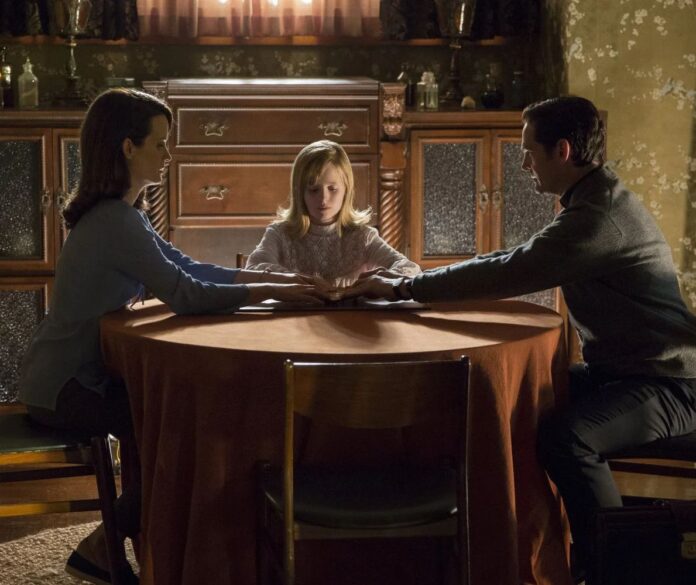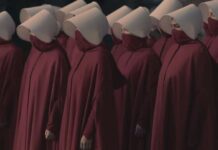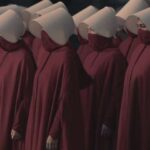Ouija: Origin of Evil, a supernatural horror film created by Flanagan and Jeff Howard that was released in 2016. The film stars Elizabeth Reaser, Annalise Basso, and Henry Thomas and is a prequel to the 2014 film Ouija. A widow and her family incorporate a Ouija board into their false seance business, resulting in the possession of the youngest daughter by a spirit. However, she unintentionally summons demonic entities, putting her family in danger. The film drew the attention of both fans and critics after its debut, thanks to its superb cast and captivating vintage feel. You could ask, though, if the film has any similarities to a real-life haunting. In such case, let us delve a little deeper.
Ouija Origin of Evil Ending, Explained – Who Is Marcus in Ouija: Origin of Evil?
Is the Ouija Origin of Evil film based on true events?
People want to know if Ouija Origin of Evil is based on a true event after hearing so many ghost stories over the years. The answer to that query, according to the official movie advertising, is no. The movie is technically based on the Hasbro board game of the same name. Actual (albeit not usually true) stories inspired The Exorcist, The Conjuring, and other horror masterpieces. Veronica (Spanish: Verónica) is one of the rare horror films based on true events that is based on true events. Veronica is a supernatural horror film directed by Paco Plaza and released in 2017. The film is inspired on the 2001 book Beware the Night, which chronicles the true-life supernatural exploits of Ralph Sarchie, a New York City officer who investigates terrifying demonic possession cases. Psycho and The Exorcist, for example, give high-octane nightmare fuel shocks in part because their fictitious storylines are based on very real, and very horrific, incidents.
The Zander family setup allows Flanagan to address important topics like as mourning, sibling rivalry, and alternative belief addiction – and the tensions in the house of women make for unsettling drama even before the manifestations increase to thrill-ride dimensions. Mike Flanagan and Jeff Howard collaborated on the writing. ‘Before I Wake’ and ‘Oculus,’ the latter’s prior collaborations with Flanagan, For the first film, they worked with the same characters created by Juliet Snowden and Stiles White. Classics such as ‘The Changeling,’ ‘The Exorcist,’ and ‘The Watcher in the Woods,’ were Flanagan’s cinematic influence for the era feel of the film.’
What is the origin of the Ouija Board? Who invented the board?
Ouija boards were first introduced as a family game, but they quickly evolved into something to be afraid of. The widespread belief is that the Ouija board was called after the French and German phrases for “yes,” but according to historian Robert Murch (via Atlas Obscura), this is not the case. Robert Murch: Its beginnings are still a mystery, but a few things occurred in 1886. We know talking boards existed in Ohio because of an Associated Press story about new talking boards taking throughout northern Ohio, but a man named Charles Kennard, who lived in Chestertown, Maryland, claimed to invent the board that would become Ouija. He asked E.C. Reiche, a cabinet maker and coffin maker who worked right next to him, to make a few for him. So Reiche [later] alleges that he, too, came up with the idea, and that Charles Kennard stole it and turned it into a business. As a result, we have no idea [who did it].
From 1886 through 1890, it was a tremendous hit in Chestertown. Then Kennard travels to Baltimore, where he meets lawyer Elijah Bond. They have a séance with Bond’s sister-in-law Helen Peters, whom Bond refers to as a “powerful medium,” in April 1890, to ask the board what it wishes to be called. When they inquire what it means, it spells out “O-U-I-J-A,” and the board spells out “G-O-O-D L-U-C-K.” The location of the séance, 529 N. Charles Street, is still standing. It’s a 7-Eleven, after all.
#OuijaFact: Ouija patentee Elijah Bond’s headstone is one the most popular attractions in Baltimore. Tag a friend! @TalkingBoardHS pic.twitter.com/F9NwwQsWpw
— Ouija:Origin of Evil (@OuijaTheMovie) January 12, 2017
So Elijah Bond applies for a patent, and the patent office tells him that he must demonstrate that it works. Helen Peters’ grandson claims that his grandma told his family the following story: Bond took Peters to the United States Patent and Trademark Office in Washington, D.C. They show it to the first clerk, who responds, “I don’t want to make a fool of myself.” ‘If that device can spell out my name, then you’ve got your patent,’ says the head clerk. Peters gets the Ouija Board out of his bag. It is spelled out in his name. ‘OK, you’ve got your patent,’ replies the head clerk, apparently frightened. However, the patent is silent on why it works.
What was going on at the time that might have contributed to its popularity?
#OuijaFact: People have been playing with Ouija boards (also known as "talking boards") since the 1890's. #OuijaMovie @TalkingBoards pic.twitter.com/Mi58sFQatE
— Ouija:Origin of Evil (@OuijaTheMovie) January 4, 2017
During the Civil War, when there was a great deal of death and every family lost a father, son, grandfather, or nephew, spirit communication devices became popular. They couldn’t return the body if [victims] didn’t have identification. As a result, these spirit communication devices were employed to provide answers to queries that no other method could: My father was conscripted into the army. Why didn’t he return? Economic downturns and wars seem to be when a lot of “discussion boards” spring up. You wrote letters, waited for a response, and wanted to know if your son or father was okay in the meanwhile. For example, Parker Brothers purchases the Ouija Board in 1966 during the Vietnam War, and it outsells Monopoly in 1967 ($20, Amazon). That is the first and only time a game has done so.
Ouija: Origin of Evil is not based on a genuine event, it certainly appears to be based on the numerous frightening stories that surround this strange board game.













